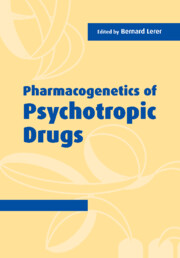Book contents
- Frontmatter
- Contents
- List of contributors
- Part I Introduction
- Part II Clinical background and research design
- Part III Molecular background
- Part IV Pharmacokinetics
- Part V Specific psychotropic drugs and disorders
- Part VI Pharmacogenetics and brain imaging
- 19 Brain imaging and pharmacogenetics in Alzheimer's disease and schizophrenia
- Part VII Industry perspectives
- Index
19 - Brain imaging and pharmacogenetics in Alzheimer's disease and schizophrenia
from Part VI - Pharmacogenetics and brain imaging
Published online by Cambridge University Press: 20 August 2009
- Frontmatter
- Contents
- List of contributors
- Part I Introduction
- Part II Clinical background and research design
- Part III Molecular background
- Part IV Pharmacokinetics
- Part V Specific psychotropic drugs and disorders
- Part VI Pharmacogenetics and brain imaging
- 19 Brain imaging and pharmacogenetics in Alzheimer's disease and schizophrenia
- Part VII Industry perspectives
- Index
Summary
OVERVIEW
In the future the current trial and error prescribing practices of physicians will be replaced by individualized treatment algorithms based upon each patient's genotype. This advance will be based on the results from large databases relating allelic variation in thousands of genes to medication response including differences in efficacy and side effects. Such databases will produce a series of probabilistic predictions based on the individual's genetic background. As useful as these data-based associations will prove, the basic underlying pathophysiological mechanisms may remain elusive. Brain imaging techniques combined with genetics can contribute to developing an understanding of the pathophysiological mechanism of disease and treatment response. These advances, coupled with developments in gene chip technology and informatics, will lead to surgery/office-based determinations of an individual's genetic background to be used in data-based individualized medication algorithms to optimize treatment.
Introduction
A primary goal of psychiatric genetics is to identify associations between allelic variation in genes and the risk for the development of psychiatric illness. The same association study strategy can be applied to understanding individual patient response to pharmacological treatment, including the occurrence of side effects. Associations between allelic variants and liability to side effects to different pharmacological agents, as well as the hierarchical likelihood of clinical response, can be established. Such associations do not necessarily point the way toward the pathophysiological mechanism of disease and can, in fact, be irrelevant.
Keywords
- Type
- Chapter
- Information
- Pharmacogenetics of Psychotropic Drugs , pp. 391 - 400Publisher: Cambridge University PressPrint publication year: 2002
- 2
- Cited by

